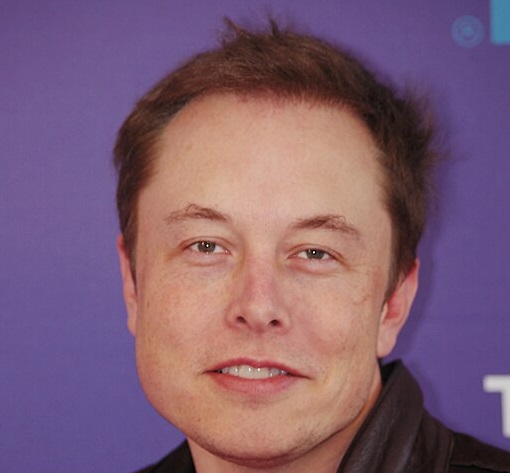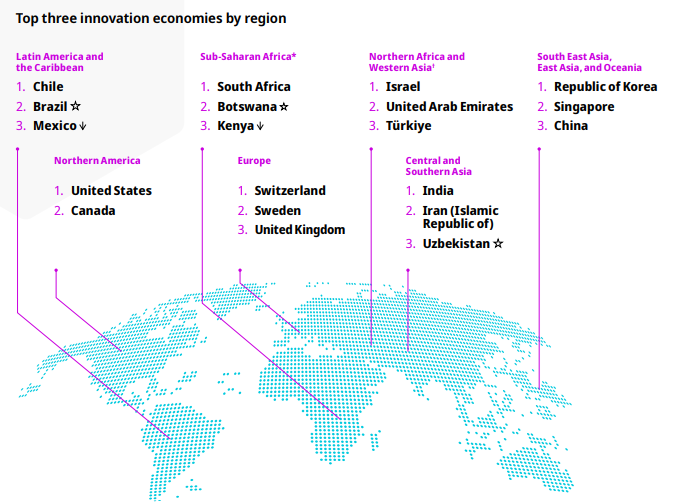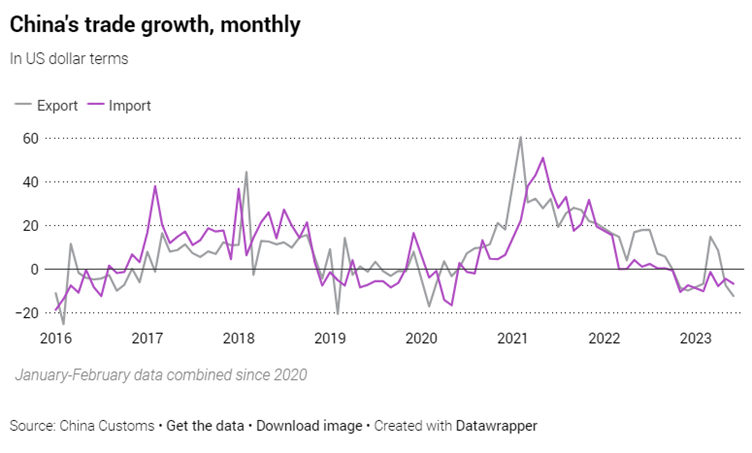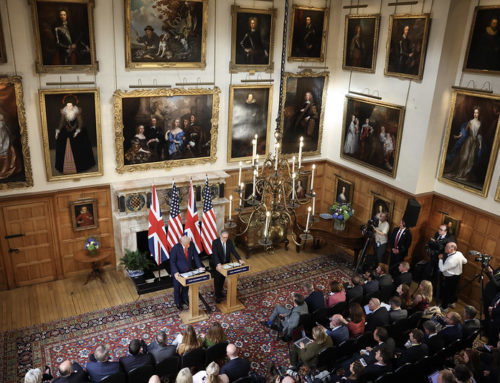1. China trade down
India China trade is down almost 1% in the first half of 2023 with China’s overall foreign trade dropping 5% in the same period. Exports were down 12.4% to June 2023 compared with the same period in 2021.
Trade in goods is down 56m with the US in the first 5 months of 2023 compared to the same period last year. The US is China’s largest trading partner.
UK exports to China were up 37.7% in 2022 whilst imports were up only 10% in the same period.
The EU’s imports from China were down in 2022 while exports remained flat.
Reports say exports to the Association of Southeast Asian Nations fell by 16.86. The ‘Association’ is made up of 11 Asian nations together which collectively would make up China’s ‘largest trade partner.’
Exports to all of China’s major trading partners recorded double digit decline in June.
Trade Horizons advisors are market entry experts: our team of in-country experts assist companies to export, import and enter new locations by using strategies that have stood the test of time and evidence-based advice. Trade Horizons assists companies to plan to distribute and deliver goods or services to a new target market. Contact one of our experts today.
2. Israel Arab FTA

Israel and the UAE signed a free trade deal in May 2022 which removed 96% of trade tariffs between the two nations with the goal of boosting bilateral trade. The deal allows Israeli companies to tender for UAE contracts. The Comprehensive Economic Partnership Agreement is reported to boost trade to more than $10bn per year within the next five years.
The N7 initiative is a partnership between the Atlantic Council and the Talpin Foundation which aims to improve the relationship between Israel and the Arab states. The Atlantic Council is an American thinktank based in Washington that was formed to encourage cooperation between America and Europe.
At the recent N7 conference a trilateral trade agreement between UAE, Israel and Bahrain was discussed and it is said a bilateral trade deal between Bahrain and Israel will soon be signed.
3. Twitter’s downfall

Image Elon Musk by David Shankbone via Wikimedia Commons
Elon Musk’s purchase of Twitter has caused devastation and uproar amongst users, companies, key thought leaders, and academics. Twitter was the bastion of social media as free press – user generated content, it was the democratic platform where anyone could have a say, and the only judge were the users. Twitter was a way for citizens to create and disseminate content – as opposed to top-down traditional media outlets which have interests and may spread propaganda without naming said interests.
Now, accounts are shadow banned without reason and the platform acts all together differently, especially for influential accounts that are key to public thought on substantial, crucial topics such as the way society treats women, children and climate matters.
One of the changes is that Musk now charges academics $42,000 per month to gather and retain data for research purposes. Other practical and political changes to the platform which mostly do not please users. Coalition for Independent Technology Research has been established in light of this. Academics report the loss of tweets but instead of simple dead links, links replaced with altogether unrelated private links.
Digital decay is a term used for the gradual degradation of online content. For example, when links go dead. Academics, professionals and thought leaders who use online platforms in their work should use Internet Archive to archive pages in order to prevent digital decay.
For the researcher who has the financial means to afford $42,000 per month in Twitter fees to access digital content as part of their research, digital decay will still occur. Furthermore, the agreement they sign may force them not to use content that does not exist anymore. Whilst those researchers that use Internet Archive and access the content outside the agreement would not be bound by such restrictions. All these upheavals fundamentally changed the premise of social media.
4. Illinois Governor in London

The Governor of Illinois JB Pritzker is to visit the UK this week on a 7-day trade mission to discuss synergies with electric vehicle manufacturing between the UK and Illinois.
Pritzker will lead a delegation of 42 people from various sectors to the UK where they will visit Goodwood Festival of Speed and meet representatives from British business and education. The UK is Illinois’ ninth largest trading partner with trade totalling $5 billion in bilateral trade in 2022.
5. Global Innovation index

A new paper out of Abu Dhabi reports that innovation positively impacts a nation’s GDP and outputs but has no significant impact on FDI.
The research is based on the Global Innovation Index 2022, a Swizz report which says that:
- Only a small number of economies have consistently delivered peak innovation performance;
- Several developing economies are performing above expectation on innovation relative to their level of economic development;
- Several economies are still struggling to translate innovation inputs into outputs efficiently.
Read the report here.
6. Philippines reduces red tape

eibner saliba via unsplash
The Philippines has announced the launch of a new strategy designed to reduce processing time on foreign investments with the aim of attracting more foreign investments. Named ‘green lanes’ the new process reduces time to incorporation for a new company. The new process aims to consolidate multiple departments with different processing responsibility into one single area, the ‘One Stop Action Center.’
Currently it takes 2-3 months to incorporate a company in the Philippines, compared to just a day or two in some more business friendly jurisdictions.
The President is keen to compete in the region with major competitors such as Thailand, Vietnam, South Korea and Indonesia.
In Thailand multiple departments are involved but the entire processing time should take around 14 days. In Vietnam the process generally takes around 25 days unless it is a conditional business which reportedly takes around 45-60 days. In South Korea the process can take anywhere from 2 weeks to 2 months depending on the type of company. In Indonesia setting up a company can take between 1 to 3 months depending on the speed of the agent (which is mandatory).
7. Turkey Association says investment coming

fatih yurur via unsplash
Members of Turkey’s International Investors Association (YASED) say that investors will make $7.1 billion in direct investments in Turkey over the next 6 months.
Turkey President Recep Tayyip Erdogan is visiting the Arab states Saudi Arabia, Qatar and the United Arab Emirates to drum up foreign funding which has lagged after his re-election in May.







